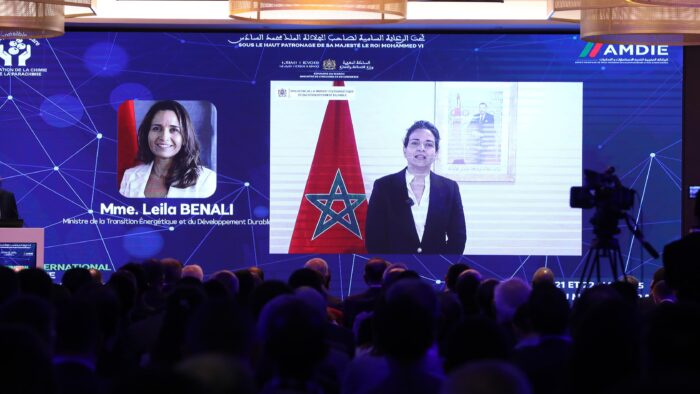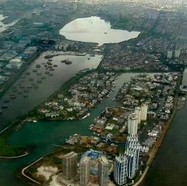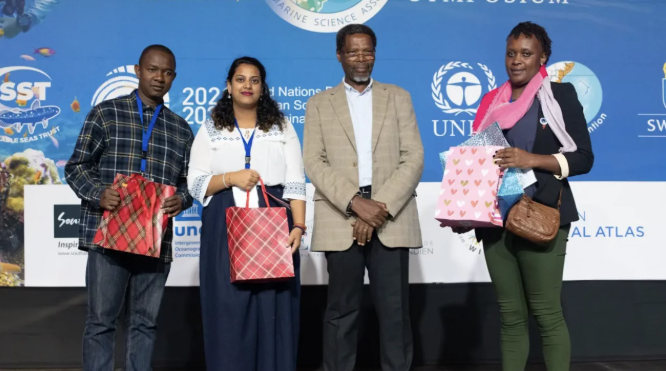As Morocco’s southern gateway facing the Atlantic, Laâyoune has emerged as one of the strategic epicenters of African maritime development during the 12th International Forum on Clean Energy and Marine Blue Technology, held in the coastal metropolis of Lisbon in late July.
The Saharan region, endowed with a coastline rich in fisheries resources, marine biodiversity, and port potential, was showcased as a regional site for multisectoral experimentation, combining energy transition, marine biocapital valorization, and algorithmic innovation. Morocco is developing an integrated ecosystem centered around the Laâyoune Industrial Acceleration Zone, the Atlantic port currently under construction, and R&D initiatives led by regional universities and research centers. The event, jointly organized by the International Forum on Clean Energy (Macau), the Portuguese Ocean Forum, and the Oeiras Investment Agency, brought together over 200 participants, including government representatives, business leaders, academic experts, and members of international organizations from more than a dozen countries such as China, Portugal, the Netherlands, France, and Morocco.
A Convergence of African Actors Around Laâyoune
In this context, Mohammed Jifer, Director of the Laâyoune-Sakia El Hamra Regional Investment Center (CRI), highlighted from Lisbon that “Africa holds one of the world’s largest maritime potentials, but its development faces structural bottlenecks in infrastructure, human capital, and technology transfer.” Emphasizing Laâyoune’s transcontinental vocation, he added, “Our region forms a strategic link between West Africa, Europe, and the Americas, serving a shared maritime project respectful of environmental balances.”
Moroccan expertise in seabed mapping, combating illegal fishing, circular economy, and integrated coastal management was praised by many African speakers. Partnerships were notably sketched out with Sub-Saharan African archipelagos eager to adapt to their scale the governance and scientific cooperation models implemented in Laâyoune.
The Morocco–Portugal Axis at the Forefront of Blue Innovation
Held at the invitation of the Portuguese government and the municipality of Oeiras, the Forum gathered policymakers, scientists, diplomats, and investors around the theme “Cooperation and Investment in the Global Blue Economy: Artificial Intelligence, Clean Energy, and Marine Biocapital.” Portugal was no random choice: the country shares with Morocco an Atlantic façade of innovation and has multiplied bilateral alliances with Rabat in recent years in oceanographic research, maritime security, and wave energy valorization.
The Forum thus highlighted triangular synergies between Lisbon, Laâyoune, and several African capitals, called upon to jointly build a decentralized, resilient, and solidarity-based blue architecture.
Technological Challenges and Long-term Investments
Discussions particularly stressed integrating artificial intelligence technologies in monitoring marine protected areas, predictive modeling of fish stocks, and port infrastructure automation. Mr. Jifer specified that “Laâyoune is developing joint protocols with several European partners to implement ethical, energy-efficient AI tools compatible with the ecological realities of the Atlantic Sahara.”
Beyond technical aspects, financing, regulation, and scientific diplomacy constraints were widely discussed. Several African financial institutions emphasized the importance of a stable and regionally harmonized incentive framework, a sine qua non condition for channeling investments to often neglected peripheral zones such as the Sahelian Atlantic coasts.
Towards a Continental Maritime Strategy Led from the South
Morocco’s participation in the Lisbon Forum fits within a broader ambition: to foster autonomous African governance of maritime spaces supported by reference hubs such as Laâyoune, Abidjan, Maputo, or Libreville. In this perspective, Moroccan authorities advocate for finer institutional coordination between continental maritime agencies, regional economic commissions, and leading African universities.
“We believe in an oceanic Africa that is no longer reduced to a geostrategic hinterland but asserted as a major maritime entity capable of negotiating its own rules with Northern powers,” concluded Mr. Jifer, calling for a profound reform of international ocean governance.




